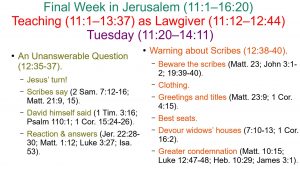Jesus’ Final Week in Jerusalem
Mark 11:1–16:20
Teaching (11:1–13:37)
King (11:1-11)
Sunday: Triumphal Entry (11:1-11).
Lawgiver (11:12–12:44)
Monday (11:12-19).
Tuesday (11:20–14:11).
Lesson from Fig Tree (11:20-26).
Jesus’ Authority Questioned (11:27-33).
Parable of Wicked Vinedressers (12:1-12).
On Taxes (12:13-17).
On Resurrection (12:18-27).
The Greatest Commandment (12:28-34).
An Unanswerable Question (12:35-37).
 Warning About the Scribes (12:38-40).
Warning About the Scribes (12:38-40).Beware the scribes.
Clothing.
Greetings and titles.
Some of the most humble men I’ve met are those who have doctoral degrees, but you’d never know it because they don’t tell you.
But how many clergyman insist on your calling them “reverend so-and-so”? How many put “Dr.” on the church sign or office door, insisting on that title, too?
In conversations with a Catholic priest, in keeping with Matt. 23:9, I refused to call him, “Father.” But he insisted I do so, and you could tell it irked him when I continued to refuse. Why? I’m not Catholic, he’s not my spiritual father as Paul was to the Corinthians (1 Cor. 4:15).
This was not unique to this Catholic priest, either. In a debate between a Reformed Baptist and a Catholic priest, one of the conditions of the debate was the Baptist had to refer to his opponent as Father So-and-so, despite his reservations.
Some have suggested that we in the churches of Christ have tended toward that by calling our preachers and elders “Bro. So-and-so.” While it’s not a bad thing to say, it’s become a title. What do you think? Is that a problem?
I don’t think so. We are free to call any man in the church “brother,” and I have never heard any minister or elder insist on being called “brother,” either.
Best seats.
As we have discussed before in Mark, the religious leaders would actually sit in the synagogues facing the congregation.
This was partly to shut down anyone teaching falsely in the synagogues, but it also had the added “benefit” of being seen by men.
They were set apart, not for a holy purpose, but for a vain one.
In most of our churches, we have no seats up at the front. And for those that do, there are few. Typically, they are for the song leader, prayer leaders, or preacher to sit briefly waiting for their turn.
I have no objection to this—it makes logical sense as a matter of expediency.
I can’t think of a whole lot of churches/denominations that do this. Maybe you can? I do remember thinking when I was younger and visiting a church how aggravating it was that it was so difficult to tell who the preacher was.
There is one exception, however: the choir.
“We have the best voices, we are the best singers, listen to us!”
There are lot of issues with a choir like this (entertainment, unauthorized), but not the least of which is the showmanship, the “best seats in the church.”
The best seats at the feasts were places of honor at the tables of those holding a feast or banquet.
In our society, this really isn’t much of an issue except in state dinners or some other situation among the elites—maybe weddings and other special events.
Typically the head of a household would sit at the head of the table, but I can’t think of any other societal norms where this would apply for the vast majority of us.
But it does speak as to the pride and false piety of these scribes.
Devour widows’ houses.
Widows were among the most vulnerable in society back then.
They were easy to take advantage of since they likely had no means of income.
They were often elderly and could not work. Their husbands were deceased and unable to provide. Most of the time, they had to rely on the generosity of their children if they had any.
Of course, there was the command to “honor your father and your mother,” but recall, this was sometimes ignored thanks to the Corban loophole (7:10-13).
So many widows were poor and destitute, but these scribes didn’t care, “charging excessive fees and [abusing their] hospitality and generosity” (Coffman).
Their houses were devoured, as a “[vulture – las] or locust settling on the ripe crops” (Swete 291; Stauffer 302).
And to cover up their wickedness, further put on an air of piety by making long prayers.
As stated, there is nothing wrong with long prayers per se, but there is when your purpose is to hide your misdeeds.
“Surely this person wouldn’t harm others! Have you heard his magnificent prayers?” or “I know they’ve done this thing that seems bad, but maybe it’s the right thing to do. His prayers prove his piety!”
Do we have (religious) people in our society who fool others into giving them their money? Just look at all the prosperity “gospel” preachers out there today, begging grandma for money so they can buy their third private jet. Just despicable.
We know the world runs on money, and we do take up a collection (1 Cor. 16:2). But we will never ask you to donate anything, especially if such a donation would cause you to lose your home or go hungry. And if I’m going on any mission trips abroad, coach in a commercial jet it is!
Greater condemnation.
Here is an interesting passage that suggests there will be degrees of punishment in hell.
Here are some others (Matt. 10:15; Luke 12:47-48; Heb. 10:29; James 3:1).
We certainly don’t know what that means exactly, just as we discussed various degrees of reward in heaven awhile back.
But I do know it’s not something I want to test!
Their wickedness and hypocrisy and their arrogance and pride would cause them to “receive greater condemnation.”
Widow’s mites (12:41-44).
